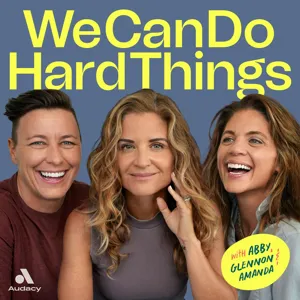Podcast Summary
Revolutionizing industries with innovative solutions: 3rd Love transformed the bra industry with half cup sizes and virtual fitting rooms, while Pampers leads in diapers with superior leak protection and gentle wipes
Both 3rd Love and Pampers offer solutions to common problems in their respective industries. 3rd Love revolutionized the bra industry by introducing half cup sizes and a virtual fitting room, providing more options for women to find a comfortable and stylish bra. Meanwhile, Pampers is the number one pediatrician-recommended diaper brand, offering superior leak protection and gentle plant-based wipes to keep babies' skin healthy. During the podcast discussion, the importance of constructive criticism versus misogyny was explored. The hosts emphasized the need to filter out unnecessary criticism and focus on feedback that contributes to personal growth. The hosts also shared their positive experiences with their communities and the importance of building a respectful and kind online presence.
The chilling effect of misogynistic criticism on women: Women face personalized criticism that polices all women, focusing on appearance and creating a 'witch burning' effect. Developing a system to process criticism impersonally can help women continue speaking out.
Women face a chilling effect when speaking out due to the pervasive nature of misogynistic criticism. This criticism is not just about the individual woman, but serves as a means of policing all women. The criticism often focuses on personal aspects such as appearance, and can create a public "witch burning" effect that discourages women from sharing their voices. However, by developing a system for sorting and processing this criticism, women can make it feel less personal and more impersonal, allowing them to continue standing up and having a voice in the face of adversity. This issue is not unique to public figures, as similar forms of criticism exist in various settings, from offices to PTA meetings. It's important for women to remember that they are not alone in experiencing this type of criticism and to continue putting their work and opinions out into the world.
Gender policing and criticism of women's worth: Women face irrelevant criticism, focusing on appearance, relationships, or personality instead of work. Focus on relationships and sending work out, ignore irrelevant criticism.
Women often face criticism that is irrelevant to their value or accomplishments, focusing on their appearance, relationships, or personality, rather than their work. This criticism, while personally hurtful, can be understood as a form of gender policing and an easy target for those who lack creativity or the ability to engage with women on a higher level. It's important to remember that the only feedback worth considering is from those in our relationships, and we should focus on sending our work out into the world rather than letting external criticism define us.
Navigating gendered feedback for women: Women face unique challenges in receiving feedback due to gendered scrutiny. Trust instincts, focus on constructive feedback, and address biases for a more equitable work environment.
Women face unique challenges when it comes to receiving feedback on their work. While men's work is often evaluated based on its merit alone, women's work and even their demeanor are often scrutinized. This can manifest in gendered feedback, where women are criticized not just for their work but for their entitlement to produce it, their communication style, and their intensity. Women must navigate this added layer of scrutiny, sorting through feedback that may not be about their work and learning to discern the difference. It's crucial for women to trust their instincts and focus on the constructive feedback that can help them grow, even if it's gendered in nature. By recognizing and addressing these biases, we can create a more equitable environment where all individuals are judged solely on the merit of their work.
Recognizing and Challenging Gendered Criticism: IXL Learning's advanced algorithm helps students excel in school, but the discussion also emphasized the importance of addressing gendered criticism and ambition. Women must recognize and challenge biased assumptions, prioritize their well-being, and focus on their goals.
IXL Learning's advanced algorithm, backed by research, consistently helps students perform better in school, making it a valuable investment for parents. With a wide range of coverage from pre-K to 12th grade, IXL is a popular choice in top school districts in the US. However, beyond the educational benefits, the discussion also touched upon the importance of addressing gendered criticism and ambition. Women often face criticism for being too ambitious or making money off their work. This can be emotionally taxing and may even lead to self-doubt and a feeling of vulnerability. It's crucial to recognize and challenge such criticism, as it often stems from biased assumptions rather than objective truths. In the end, it's essential to prioritize our well-being and focus on our goals, rather than letting fear or external criticism derail us.
Resisting the backlash against women's voices and ambitions: Women should persist in using their voices and pursuing their ambitions despite backlash, focusing on their work and weeding out gendered criticism, and remembering that all feedback should be kind and respectful.
Women face significant backlash when they use their voices and pursue their ambitions, but instead of retreating, it can be an act of resistance and freedom to persist. Women are often criticized for being ambitious or narcissistic, but they should not let these labels deter them from speaking up and making a difference in the world. The misogynistic messages telling women to be quiet and good can be resisted by continuing to do good and using their voices. Women should not have to earn the right to speak by doing good deeds, and they should not be defined by their appearance, relationships, or personality. Instead, they should focus on their work and weed out any gendered criticism. In the end, it's important to remember that all feedback should be kind and respectful.
Filter out unkind criticism: Focus on constructive feedback and let go of unkind criticism to foster growth and positive interactions.
It's essential to filter out unkind and disrespectful criticism, especially in professional and online settings. Such criticism often stems from the critic's personal biases or emotions, making it unreliable and counterproductive. Instead, focus on constructive feedback that can help improve your work and relationships. It's important to recognize and let go of criticism rooted in hate or malice, as engaging with it can be a waste of time and energy. In various contexts, including friendships, corporate environments, and everyday life, delivering criticism with respect and empathy is crucial for fostering growth and positive interactions.
Clear communication is crucial but can be challenging: Strive for clear and respectful communication, focusing on content and delivery without adding negative undertones. Building a community can help mitigate conflict.
Effective communication, especially in professional settings, is crucial but can be challenging due to perceived tone and intent. Some people may view direct communication as demanding or unkind, leading to misunderstandings and conflict. However, it's essential to strive for clear and respectful communication, focusing on the content and delivery without adding negative undertones. Building a community of people who know and care about each other can help mitigate the negative effects of criticism and conflict. In the end, investing in clear communication and comfortable clothing, like Vuori, can lead to greater happiness and productivity. Remember, clear is kind, and effective communication is an investment in your personal and professional growth.
Embracing Constructive Conflict for Growth: Constructive conflict leads to personal and business growth, while destructive conflict hinders progress. Be open to constructive criticism to learn and improve.
Constructive conflict is essential for personal and business growth, while destructive conflict and criticism can be detrimental if not handled properly. It's important to distinguish between the two and learn how to filter out the destructive elements while embracing the constructive feedback. This process can lead to significant growth, even if it's painful at first. The people who provide constructive criticism are making an investment in your development, and it's crucial to be open to their insights, even when it's difficult to hear. Remember, the ultimate goal is to learn, grow, and improve, rather than being defensive or shutting down. As Adam Grant suggests, we all need both support networks and challenge networks to thrive.
Support and challenge networks for personal growth: Understand the difference between support and challenge networks, and learn to separate constructive criticism from personal identity to grow and become more resilient.
Building a support network and a challenge network are crucial for personal growth. A support network consists of people who encourage and uplift you, while a challenge network provides constructive criticism and pushes you out of your comfort zone. However, it's important to remember that criticism, especially for women, can be overwhelming and feel personal. But it's essential to understand that it's not always about you and instead stems from societal expectations and biases. Recognizing this pattern can help you separate the criticism from your identity and continue to show up authentically, even when faced with negativity. Criticism often triggers a primal fear response related to safety needs, but acknowledging this reaction and pushing through it can lead to growth and resilience.
Understanding Perception and Response to Criticism: Recognize and challenge societal expectations that limit assertiveness and healthy response to criticism. Question sources and consider validity.
Our perception of ourselves in relation to our environment and the roles we play in it can significantly impact how we respond to criticism and interact with the world around us. The speakers in this discussion touched upon the idea that some people may feel more like predators, while others feel more like prey. This perception can be influenced by various factors, including gender and upbringing. For those who feel more vulnerable or like prey, it's essential to recognize and challenge the societal expectations that may limit their ability to assert themselves and respond to criticism in a healthy way. The discussion also emphasized the importance of questioning the sources of criticism and considering whether they hold any validity or merit. Ultimately, the goal is to empower individuals to break free from limiting gender roles and navigate the world with confidence and resilience.
Fear of criticism can hold us back from living our best lives: Focus on filtering out unconstructive criticism and embrace the small percentage that can help us grow
Fear of criticism often prevents us from pursuing our passions and living our best lives. It's a common experience, and many people claim they won't care about criticism when they put themselves out there. However, it's important to acknowledge that criticism will hurt, and it's a natural response. The goal isn't to be criticism-free but to learn how to handle it effectively. We should focus on filtering out the 95% of criticism that isn't constructive and isn't personal, and instead, embrace the small percentage that can help us grow. Remember, it's okay to care and be afraid, but don't let fear hold you back from showing up and doing what you were meant to do. We're all imperfect, and that's what makes us perfect. So, keep pushing through the hard times, and remember, we can do hard things together.





